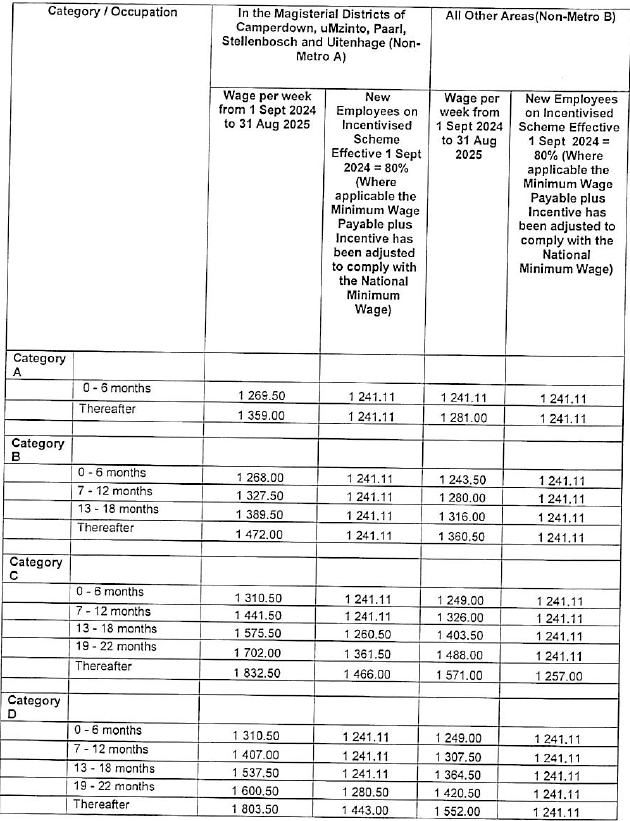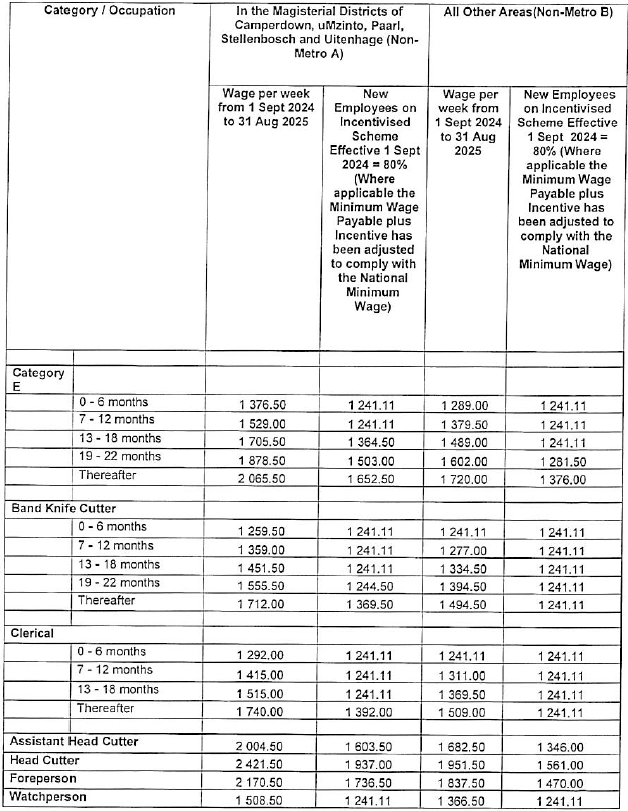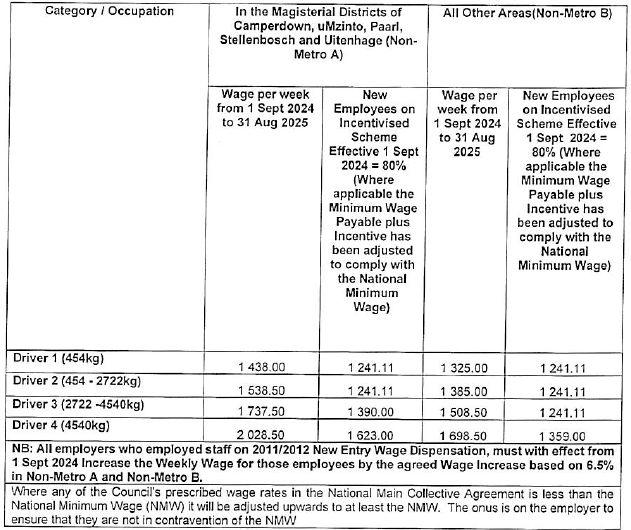 Petroleum Pipelines Levies Act, 2004
Petroleum Pipelines Levies Act, 2004
R 385
Labour Relations Act, 1995 (Act No. 66 of 1995)NoticesNational Bargaining Council for the Clothing Manufacturing IndustryMain Collective AgreementPart I : Provisions for the Non-Metro Areas4. Remuneration |
Where any of the Council's prescribed wage rates in the National Main Collective Agreement is less than the National Minimum Wage (NMW) it will be adjusted upwards to at least the NMW. The onus is on the employer to ensure that they are not in contravention of the NMW.
[Words preceding Part I(1) inserted by section 11(2) of Notice No. R. 421, GG44572, dated 14 May 2021]
| (1) | Minimum wages: The minimum wages which an employer shall pay to employees shall be as specified herein: Provided that if a new employer, as defined in clause 3, has been engaged in the industry for a period of not more than 12 months, such wages may be reduced by not more than 10 per cent during such period, whereafter the minimum wages specified herein shall become payable: |



[Part I Clause 4(1) wage schedules substituted by section 11(1) of Notice No. R. 5831, GG52054, dated 7 February 2025]
| (2) | The metro and non-metro B wage differential shall be narrowed, relative to the KZN metro qualified machinist rate (not the incentivised wage), as follows: |
|
with effect from 1 September 2013: |
to 71% |
|
with effect from 1 September 2014: |
to 73% |
|
with effect from 1 September 2015 and thereafter: |
to 75% |
(3) New Employees
| 3.1 | New employees shall be paid a weekly wage of 80% of the rate in non-metro and all other areas, subject to the following provisions: |
| 3.1.1 | New employees are those persons with no previous working experience in the industry and shall include those persons with previous work experience but who have not been employed in the industry for a period of 3 years. |
| 3.1.2 | The provision is only applicable to compliant companies. |
3.1.3
| (a) | The new entry-level wage provision will continue in force and effect as an industry-wide provision after the 31st August 2014 if there has been an increase in employee strength of compliant employers in the industry of at least 15% as at 31st March 2014, monitored on a bi-annual basis. |
| (b) | The bi-annual benchmark monitoring shall be measured against the following schedule of new employment growth: |
| 1 March 2012: | 3% increase |
| 1 September 2012: | 6% increase |
| 1 March 2013: | 9% increase |
| 1 September 2013: | 12% increase |
| 1 March 2014: | 15% increase |
| 3.1.4 | It is only applicable to those compliant companies who were in existence and operational as at 1 June 2011. |
| 3.1.5 | All other provisions of the main agreement shall be applicable to new employees. |
| 3.1.6 | The closed shop shall be applicable to all new employees. |
3.1.7
| (a) | The employee strength to determine whether or not there has been an increase in employee strength will be measured by comparing the employee strength of compliant employers whose businesses are registered with the bargaining council on the 1st June 2011, as per clause 3.1.3, and to that of the employee strength of compliant employers whose businesses are registered with the bargaining council on the 31st March 2014, i.e. a period of 30 months following the implementation of this Agreement. |
| (b) | In the event that the employee strength does not increase as per the provisions of this Agreement and more specifically, the provisions of Clause 3.1.3 above, the provisions of the new-entry wage provision will terminate. |
| (c) | Upon such termination of the application of the new entry level wage provision, the wages of all employees earning the new-entry wage will be increased to the full applicable gazetted wage for all job categories from the first pay week following the 31st August 2014, unless the parties during the 2014/2015 round of annual or other negotiations agree otherwise or agree to an alternative to address any further job losses or the absence of job growth in the industry. |
| 3.1.8 | Employers shall not embark on retrenchment exercises, where the intent of such retrenchment is to employ employees at the rates specified in subclause 3.1.3 (a) above. |
| 3.1.9 | Employers will ensure that short time arrangements are at all times fairly and equitably distributed across a workplace’s employees in all job categories affected by short time arrangements. |
| 3.1.10 | Qualified employees shall be employed at the qualified new entry rate, subject to subclause 3.1.1. |
| 3.1.11 | Effective 1st September 2011, all retrenched employees will, within a period of 12 months of having been retrenched, be given preferential employment in the same job category at the same wage rate which was applicable at the date of the employee’s retrenchment or any higher wage rate which may have been gazetted and become applicable to the affected employee’s job category after such date of retrenchment. |
(4) Incentivised Wage Rates
The new entry wage rates' provisions as specified in clause 4 of the 2011/2012 party-to-party substantive agreement shall be abolished and replaced with the following incentivised wage rates provisions, applicable to new employees only:
| 4.1 | With effect 1 September 2012, new employees shall be paid a guaranteed wage of no less than 80% of the normal qualified gazetted wage rate applicable to current employees, subject to the following provisions: |
| 4.2 | New employees are those persons with no previous working experience in the industry and shall include those persons with previous work experience but who have not been employed in the industry for a minimum period of 3 years, unless the applicant employee agrees otherwise with his/her prospective employer. |
| 4.3 | The guaranteed wage rate as specified in subclause 4.1 above shall be supplemented with an incentivised wage component which shall allow new employees to earn up to 100% or more of the qualified rate, provided that the employee(s) meets the required performance standards as contained in the plant level incentive scheme. This incentive shall be applicable to all new employees engaged under the incentivised wage provisions and employed after 1 September 2012, once a national framework agreement governing the incentive portion has been agreed. |
| 4.4 | The provisions of clause 4 of this circular is only applicable to companies which are registered with the National Bargaining Council for the Clothing Manufacturing Industry of South Africa. |
| 4.5 | All other provisions of the industry's Main Agreement shall be applicable to new employees. |
| 4.6 | The closed shop shall be applicable to all new employees. |
| 4.7 | Employers shall not embark on retrenchment exercises, where the intent of such retrenchment is to re-employ employees at the rates specified in sub-clause 4.1 above |
| 4.8 | Employers will ensure that short time arrangements are at all times fairly and equitably distributed across a workplace's employees in all job categories affected by short time arrangements. |
| 4.9 | Qualified employees shall be employed at the qualified rate, subject to sub-clause 4.2. |
| 4.10 | Current employees employed in terms of the new entry rate provision envisaged in the 2011/2012 party to party agreement, which was subsequently extended to non-parties and who were so employed prior to 1 September 2012 shall by exemption be ring-fenced on those rates plus the annual increases, and subject to the companies at which they are employed meeting the compliant employment growth targets as set out in the 2011/2012 wage agreement. |
| 4.11 | Effective 1st September 2012, all retrenched employees will, within a period of 12 months of having been retrenched, be given preferential employment in the same job category at the same wage rate which was applicable at the date of the employee's retrenchment or any higher wage rate which may have been gazetted and become applicable to the affected employee's job category after such date of retrenchment. |
| 4.12 | The parties shall negotiate a national framework agreement at national bargaining council level, to give enabling effect to the plant level incentivised wage component as contemplated in sub-clause 4.3 of this agreement. This shall be finalised within a period of 4 months with effect from 1 October 2012 (excluding the annual shutdown period). Thereafter, companies who qualify for the provisions of clause 2 of this agreement and who wish to implement it shall have a 2 month period to conclude plant-level incentive arrangements in terms of the provisions of the national framework agreement. |
| 4.13 | The deadlock breaking mechanism for the national framework agreement is either binding interest arbitration or, at the end of the prescribed period, the entire 80% dispensation falls away, unless other forms of deadlock breaking mechanisms are agreed between the parties. |
| 4.14 | Should the 80% dispensation fall away in consequence of the provision in subclause 4.13 above, new employees employed on the incentive wage provisions should be paid 100% of the applicable agreement rate. |
| 4.15 | The deadlock breaking mechanism for operationalising the incentive component at plant level shall consist firstly of a facilitation process by a panel of experts jointly appointed by the employer and trade union parties to this agreement and if not resolved, by an advisory award by the panel, unless other forms of deadlock breaking mechanisms are agreed to between the parties. |
| 4.16 | The parties agree that the only outstanding issue pertaining to the national incentivised framework agreement is the deadlock breaking mechanism. The Parties agree to finalise this matter within two (2) weeks from the date of signing this agreement, failing which the provision of sub-clause 4.13 above will become effective. |
| (5) | Basis of contract - For the purposes of this clause the contract of employment of an employee shall be on a weekly basis, and except as provided for in clause 7(4) or where law otherwise permits, he or she shall be paid in respect of a week not less than the full weekly wage prescribed in subclause (1), read with the definition of "wage" in clause 3 and with subclause (5), for an employee of his or her category in the area in which he or she works. The provisions of this subclause are not intended to have the effect that permanent employees are deemed to be, or be regarded as, fixed term contract employees. |
| (6) | Differential wage - An employer who requires or permits a member of one category of employees to perform work for longer than one hour on any day, either in addition to his or her own work or in substitution therefore, in another category for which: |
| (a) | a wage higher than that of his or her own category is set out in subclause (1), shall pay to such employee in respect of that day, not less than the daily wage calculated at the higher rate; or |
| (b) | a rising scale of wages terminating in a wage higher than that of his or her own category is set out in subclause (1), shall pay to such employee in respect of that day not less than the daily wage calculated on the notch in the rising scale immediately above the wage which the employee was receiving for his or her ordinary work: Provided that— |
| (i) | this subclause shall not apply where the difference between categories in terms of subclause (1) is based on experience; |
| (ii) | unless expressly otherwise provided in a written contract between an employer and an employee, nothing in this part of the Agreement shall be so construed as to preclude an employer from requiring an employee to perform work of another category for which the same or a lower wage is prescribed. |
| (7) | Calculation of wages– The hourly, daily or monthly wage of an employee shall be calculated as indicated in the definitions of these expressions in clause 3. |
| (8) | Dual Operations – Where an establishment performs operations in both the garment knitting and clothing sectors of the Industry, the wage schedule to be applied in respect of the following occupations namely— |
|
(a) |
boiler attendant |
: |
Categories |
A + D |
|
(b) |
cleaner |
: |
" |
A + D |
|
(c) |
cutter |
: |
" |
B + C |
|
(d) |
examiner |
: |
" |
B + D |
|
(e) |
general worker |
: |
" |
A + D |
|
(f) |
packer |
: |
" |
A + D |
|
(g) |
plain sewer |
: |
" |
A + C |
|
(h) |
presser |
: |
" |
B + D |
|
(i) |
sewing machinist |
: |
" |
B + C |
|
(j) |
sorter |
: |
" |
A + D |
shall be that of the sector in respect of which the majority of employees are employed at the establishment.
| (9) | Notwithstanding anything to the contrary herein, the wage of an employee who, immediately prior to the date on which this part of the Agreement comes into operation, is in receipt of a wage higher than that specified for the class of work in which he is engaged shall, with effect from the date on which this part of the Agreement comes into operation, be increased by an amount not less than the difference between the wage as agreed by the Parties as at 1 September 2019 and the wage specified for the same class of work in the agreement in force immediately prior to that date. |
[Clause 4(9) substituted by section 1 of Part I of Notice No. R.80, GG42979, dated 31 January 2020]
(10) Annual Bonus —
| (a) | Each employee shall be paid an annual bonus on the day of his employer"s annual closure in December each year, equivalent to 1,0% of his annual basic prescribed wage (excluding overtime earnings and production bonuses) calculated from 1 January to 31 December. A pro rata share thereof shall be paid to an employee who leaves employment before 31 December. |
(b) The bonus is inclusive of and not additional to any annual bonus paid by an employer.
| (c) | An employee shall not suffer a reduction in the amount of the annual bonus as a result of periods of authorised absence from work. |
(11)
| (i) | This agreement shall come into operation with effect from 1 September 2011 for employers who are members of parties to the agreement, and with effect from the date of extension of the agreement in respect of non-parties. |
| (ii) | All employers covered by the registered scope of the NBC shall implement the wage increases agreed to at NBC level and/or |
All employers covered by the registered scope of the NBC who have not implemented the wage increases agreed to at NBC level shall implement a 10% wage increase for metro areas and the rand equivalent for non-metro areas with effect from 1 September each year.
Table of Clauses
|
Clause No. |
Existing 2023/2024 |
New 2024/2025 |
|
32(2) |
R4,73 |
R5,03 |
|
32(2) |
R6,00 |
R6,39 |
|
32(2) |
1 September 2023 |
1 September 2024 |
|
36(6)(a) |
77 cents |
82 cents |
|
40(1) |
31 August 2024 |
31 August 2025 |
|
40(1) |
1 September 2024 |
1 September 2025 |
|
Annexure C of Clause 43(5) |
25 cents |
27 cents |
[Table of Clauses substituted by section 11(2) of Notice No. R. 5831, GG52054, dated 7 February 2025]
| (d) | A once-off payment equivalent to one (1) day's pay at the rates applicable as at the end of December 2020 shall be paid to all employees by no later than 1st June 2021. |
[Clause 4(11)(d) inserted by section 11(5) of Notice No. R. 421, GG44572, dated 14 May 2021]